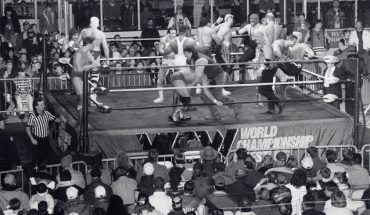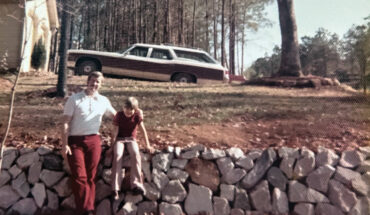The recently-named Ms. Wheelchair America shares her journey from a hard-partying lifestyle to becoming a candid voice for people with disabilities.
by Billy Warden | photography by Joe Pellegrino

Aug. 21, 2010: In photos of the day her world shattered, Ali Ingersoll is honey blonde and sun-kissed. She is 27, confidently sporting a blue string bikini, frolicking with handsome friends at a Bahamas tiki bar that juts over a calm, emerald Atlantic Ocean. Laughing and grooving to Lady Gaga, Ingersoll approaches the tiki bar’s edge and dives in. Her skull slams into the sand. Her neck snaps. She tries to push her head above the sloshing surface — but she cannot move.
Twelve years later, Ingersoll rolls through a slanting rain in Raleigh.
Compression gloves protect her hands and forearms from the March wind. Without them, her bare skin would suffer pinpricks of pain — one of the many symptoms of being a quadriplegic, the result of her shallow dive.
Paralyzed from the chest down, Ingersoll guns her motorized wheelchair to the next storefront at The Village District shopping center. With the help of her caretaker, she maneuvers inside to make her pitch.
Her radiant smile, still framed by blond tresses, seals the deal. Ingersoll nets another contribution to the array of auction items — gift certificates and swank merchandise — for the Casino Night fundraiser of the Alliance of Disability Advocates in North Carolina.
In her first year as the group’s board chair, Ingersoll is betting big on the success of Casino Night. She started the position shortly after taking the title of Ms. Wheelchair North Carolina 2022. Now, as we chat, she’s ramping up to compete in the Ms. Wheelchair America pageant in Michigan — a crown she will, indeed, win a few weeks from this moment.
“In one of the rounds, I have to dress up like a mermaid,” she chuckles. “Actually, that could be kind of fun.”
Ingersoll’s up-for-anything drive, high- beam optimism and advocacy for people with disabilities have taken her from physical and sometimes emotional wreck to local celebrity and emerging national leader. In June, she throttled through Capitol Hill, lobbying lawmakers on behalf of the United Spinal Association.
When not advocating or making a living as a corporate disability consultant and day trader, she chronicles her twisting life on her tell-all social feeds and blog, QuirkyQuad.com. Seeking tips on squeezing benefits out of a reluctant insurance behemoth? They’re here. Insights on intimacy with a quadriplegic? Here. A dash of dark humor? Here, too.
Working from a wall of voice dictation computers in her airy condo, Ingersoll touches everyone from CEOs to fellow folks with disabilities “who aren’t as fortunate financially as I am, who have to count catheters.”
“Ali is one of the most impressive individuals I’ve ever met,” says Alliance executive director Vicki Smith. “She’s passionate. She’s frank. She works tirelessly. She is who we are trying to help other people in her situation to be.”
She is also complicated. “I have demons,” Ingersoll says, “and they start coming out when I’m too quiet. I compartmentalize my life. I keep padlocks on the different compartments. Though sometimes they come out.”
Face-down in the waters of the Bahamas, unable to move, Ingersoll wondered if she would drown. “I remember the crash,” she says. “I didn’t lose consciousness. I was kind of terrified.” Her entourage — including her mother — pulled her out. Loaded onto the back of a pickup truck, dragging on a joint to calm her nerves, she waited as her parents scrambled to secure an emergency jet to the mainland.
By that point in her kaleidoscopic life, jets were nothing new. Her family had always been on the go: England, France, Germany, China. Ralph, her father, was a publishing executive in the United States and Europe. Between work and vacations, the family traveled far and wide. Ingersoll’s childhood was a bright romp, but with adolescence came shadows. “I was an overweight kid with glasses and braces,” she says. “High school was hell. I was bullied. I never fit in. I was a loner.”
With time, though, her body stretched, her features sharpened, her teeth straightened and she emerged a bona fide beauty, out to “make up for lost time.” “A psychologist would say I was overcompensating,” she says. “I was a blond, tan kickboxer, and I went WILD.”
At Occidental College in Los Angeles, a party-hearty friend took to performing at a “gentlemen’s club,” where, Ingersoll says, Hugh Hefner himself discovered her. The friend wound up not only in the pages of Playboy, but as a resident of Hefner’s mansion, with Ingersoll frequently joining her. “There were trampolines and monkeys wandering around the grounds,” she smiles. “There was everything.”
The whirlwind of parties accelerated into a cyclone throughout her 20s. Money. Cocaine. First in Los Angeles, later in Miami. “This was the pinnacle of my coolness. We went to all the clubs. We were treated like kings and queens,” she recounts. “I’d fly off to the South of France with rich guys. Islands. Yachts.”
The storm of excess capsized the metaphorical pleasure cruise. Ingersoll’s college career sunk. Cocaine buoyed her, but only temporarily. She felt “embar- rassed and ashamed.” Looking back, she wonders, “Was I really an addict, or was I just lost and lonely? I still don’t know.”
She checked into rehab, followed by more college and a couple professional ventures, before she headed to her family’s home in the Bahamas to study up on a new career: day trading. To celebrate the conclusion of a training course, she headed to the local tiki bar.
Casino Night arrives in a spring gale of last-minute preparation. Ingersoll enlists her two caregivers to help prepare gift baskets and lock down logistics.
As caregiver Briana Lindsey puts it, “Ali doesn’t get stressed — Ali gets focused.” By April, Ingersoll has secured 50 contributing businesses and 18 gift baskets. Her drive isn’t just run-of-the-mill Type-A gear grinding, it’s what has kept her alive. “After the accident,” she says, “I had six years of medical hell and then stagnation.”
Hell included the discovery of a massive cyst on her lower spinal cord in 2013. It was creeping upward, possibly bringing death. U.S. doctors deemed surgery too risky, so Ingersoll’s father identified willing surgeons in China.
Returning to the U.S., Ingersoll worked fitfully through understanding her traumatized body and finding caregivers. As she adapted, she took to heart her father’s counsel, which she boils down to: “Your body’s broken; your mind is not.”
She settled in Raleigh, home to one of her three siblings. Her parents joined her in a leafy condo enclave off Glenwood Avenue. The neighbors embraced her.
Eventually, she reached a point where she could indulge another ongoing interest: the opposite sex.
On dating apps, she was wide open about being in a wheelchair. She set her first date for a coffee shop. She waited. And waited. She was being stood up, she knew, but she couldn’t leave it at that. So, still sitting there, she called the guy. And called. Until he answered and copped to “chickening out” about dating a quad.
In 2016, she met Aaron Watkins, an adventurous sort who once lived out of a van while working in an oil field. Three years later, they married. “I just wanted someone I enjoyed spending time with and have things in common with — an interest in economics, dark humor,” Watkins says. “I didn’t have any idea what I was getting into. But here I am!”
Watkins has been front row for Ingersoll’s transformation from survivor to activist. “She’s really redefined her sense of purpose,” he says. “It’s not just about the day-to-day anymore. She’s involved in the community, responsible to other people. And that’s what builds character.”
At Casino Night in April, Ingersoll is a queen in her own kind of carriage. Draped in her signature Lilly Pulitzer colors, she is — as on that fateful day. in the Bahamas — the beaming life of the party. Her auction items find eager takers at robust prices. The Alliance hits its goals.
And the lonely kid who never fit in, who partied herself dizzy and who thought she’d lost everything, says of her new life and all its exploits: “I’ve never had a high like this.”
While Billy Warden was reporting this article, Ingersoll invited him to spend an evening in a wheelchair to understand her challenges. Read about his experience here.
This article originally appeared in the September 2022 issue of WALTER Magazine.



